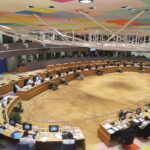
An official installed by Russia in the Kherson region of southern Ukraine says grain from the area is being sent to Russia.
Kirill Stremousov, the deputy head of the Russia-backed administration for the Kherson region, told Russia’s Tass state news agency on Monday that grain from last year’s harvest was being delivered to Russian buyers.
“There is space for storing (the next crop) although obviously there is a lot of grain here,” Stremousov was quoted as saying. “Now people are partially exporting, having reached agreements with those who are buying from the (Russian) side.”
Tass also reported that Stremousov said sunflower seeds could be sent to Russian processing plants to make sunflower oil.
Ukraine has accused Russia of looting grain and farm equipment from territories held by its forces and the U.S. has alleged Russia is jeopardizing global food supplies by preventing Ukraine from exporting its harvest.
Russian troops overran most of the Kherson region in the early weeks of the war and have tightened their grip on the area since. Deputy Prime Minister Marat Khusnullin visited the region earlier this month and suggested it could become part of “our Russian family.”
___
KEY DEVELOPMENTS IN THE RUSSIA-UKRAINE WAR:
— Russian troops entering Sievierodonetsk in eastern Ukraine
— EU wrestles with Russia oil embargo as leaders gather
— War in Ukraine adds to food price hikes, hunger in Africa
___
Follow AP’s coverage of the war in Ukraine at https://apnews.com/hub/russia-ukraine
___
OTHER DEVELOPMENTS:
MOSCOW — The Russian military says it has struck a shipbuilding factory in Ukraine’s south.
Russian Defense Ministry spokesman Maj. Gen. Igor Konashenkov said Monday that a Russian artillery strike on the shipyard in the port of Mykolaiv destroyed Ukrainian armored vehicles parked on its territory.
Konashenkov said that Russian artillery hit 593 areas of concentration of Ukrainian troops and equipment and 55 artillery batteries over the last 24 hours.
He added that the Russian air force hit three command posts and 67 troop locations.
___
KYIV, Ukraine — A regional governor says an intense battle is going on for the key city of Sievierodonetsk in eastern Ukraine.
Luhansk governor Serhiy Haidai said that that Russian forces have entered the outskirts and were pushing toward nearby Lysychansk. He said Monday that two civilians were killed and another five were wounded in the latest Russian shelling.
The Ukrainian military also said that Russian forces were reinforcing their positions on northeastern and southeastern outskirts of Sievierodonetsk and bringing additional equipment and ammunition into the area to press their offensive.
Sievierodonetsk has been a key target of the Russian offensive in Ukraine’s eastern Donbas industrial heartland. The city has served as the administrative center for the Luhansk region, which makes up Donbas together with the neighboring Donetsk region.
___
BRUSSELS — European Union leaders will gather Monday in a new show of solidarity with Ukraine but divisions over whether to target Russian oil in a new series of sanctions are exposing the limits of how far the bloc can go to help the war-torn country.
Ukrainian President Volodymyr Zelenskyy, who will address the 27 heads of state and government by videoconference in the evening, has repeatedly demanded that the EU target Russia’s lucrative energy sector and deprive Moscow of billions of dollars each day in supply payments.
But Hungary is leading a group of countries – along with Slovakia, the Czech Republic and Bulgaria – that rely on Russian oil and can’t afford to take such steps.
The EU has already slapped five rounds of sanctions on Russia over its actions in Ukraine. A sixth package was announced on May 4, but the hold up over oil is embarrassing the bloc. Ahead of the summit, officials suggested that a solution might be found by targeting oil transported by ships and holding fire on the pipeline oil so valuable to Hungary.
___
BERLIN — Germany’s governing parties and the main opposition party have reached a deal to move ahead with a big increase in defense spending that Chancellor Olaf Scholz announced three months ago.
Scholz told German lawmakers three days after the Russian invasion of Ukraine started that the country would commit 100 billion euros ($107 billion) to a special fund for its military and raise its defense spending above 2% of GDP — a measure on which it had long lagged.
Scholz wanted to anchor the special fund in the constitution. That requires a two-thirds majority in both houses of parliament, meaning that the chancellor needed support from the center-right opposition Union bloc.
Talks on the issue became mired in details, but the two sides reached an agreement Sunday night that clears the way to bring the fund to parliament. Among other things, funding for cyberdefense and support for partner countries will come from Germany’s regular budget, not the special fund.
___
MOGADISHU, Somalia — Families across Africa are paying about 45% more for wheat flour as Russia’s war in Ukraine blocks exports from the Black Sea.
Some countries like Somalia get more than 90% of their wheat from Russia and Ukraine. That’s forcing many people to substitute wheat for other grains. But the United Nations is warning that the price hikes are coming as many parts of Africa are facing drought and hunger.
The U.N. already had warned that an estimated 13 million people were already facing severe hunger in the wider Horn of Africa region as a result of a persistent drought. The World Food Program chief say’s Russia’s war on Ukraine is “piling catastrophe on top of catastrophe” for the world’s poor.




